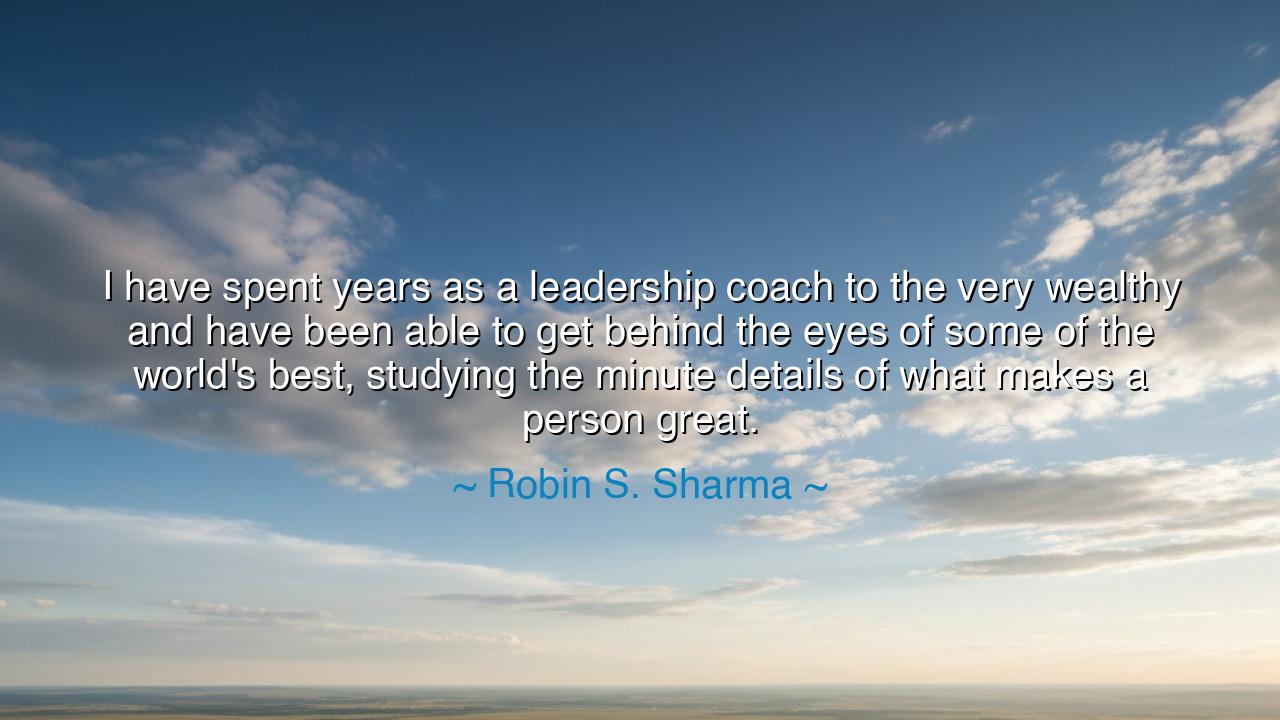
I have spent years as a leadership coach to the very wealthy and
I have spent years as a leadership coach to the very wealthy and have been able to get behind the eyes of some of the world's best, studying the minute details of what makes a person great.






There is a quiet majesty in the words of Robin S. Sharma, for they come not from theory but from long observation — from the silent corridors of power where greatness is both born and tested. When he says, “I have spent years as a leadership coach to the very wealthy and have been able to get behind the eyes of some of the world's best, studying the minute details of what makes a person great,” he speaks as a witness to the inner workings of mastery. This is not merely about wealth or success; it is about entering the hidden sanctum of human excellence — the invisible mechanics that separate those who merely live from those who lead.
The origin of this insight lies in the ancient art of apprenticeship. In every civilization, from the philosophers of Greece to the samurai of Japan, the student sought to “see through the master’s eyes.” To get behind the eyes of another is to enter their world — to understand not only their methods but their mindset, their doubts, their rituals, and their silent struggles. Robin Sharma’s words remind us that true greatness is not visible to the casual observer. It resides in the minute details: how one wakes, how one speaks, how one reacts when unseen by others. These details are the secret chambers of character, the unseen scaffolding that supports every visible achievement.
Consider the story of Leonardo da Vinci, who spent years studying the movements of birds, the flow of water, and the anatomy of the human hand. His genius did not come from grand gestures but from tireless attention to the smallest details. In each stroke of his brush was the weight of patient observation. So too, those whom Sharma has studied — the “world’s best” — have learned that excellence is born from the accumulation of small disciplines performed with reverence and consistency. Greatness, like art, is constructed grain by grain, until the masterpiece emerges.
To study what makes a person great is to confront humility. The true student must shed ego and learn to listen to the subtle rhythms of the masters — how they pause before speaking, how they hold silence, how they recover from failure without bitterness. This is the sacred mirror of learning: the teacher reflects not perfection, but persistence. Many believe that greatness is inherited or granted by fortune, yet Sharma’s years among the powerful reveal a deeper truth — that greatness is a craft, and like any craft, it must be honed in solitude, forged by repetition, and illuminated by introspection.
There is also a moral heartbeat within these words. In a world that worships outcomes — wealth, status, recognition — Sharma turns our gaze to inner architecture. The “minute details” he speaks of are not just habits of work but habits of spirit: compassion, focus, gratitude, discipline, and service. To be great is not merely to command others, but to command oneself. The wealthy and the wise who fail to master their emotions or their purpose are but gilded vessels — beautiful yet empty. True leadership, as Sharma has seen, is not about power over others, but power over the self.
From these reflections emerges a lesson worthy of being etched in stone: observe deeply, act deliberately, and refine constantly. Those who wish to rise must first learn to see — not just with the eyes, but with understanding. Spend your days studying the quiet heroes around you: the craftsman who works without complaint, the mother who builds her children’s future with unseen labor, the leader who listens before commanding. Within their ordinary actions lie extraordinary truths.
So, dear listener and seeker of wisdom, take this teaching as a call to inner apprenticeship. Watch your own life as Sharma watched the great — with attention, with curiosity, with reverence for detail. Let no moment pass without reflection, no habit form without awareness. For in time, as you study the patterns of greatness and apply them in the temple of your own life, you too shall get behind the eyes of the master within yourself. Then, and only then, will you know what it means to be truly great.






AAdministratorAdministrator
Welcome, honored guests. Please leave a comment, we will respond soon